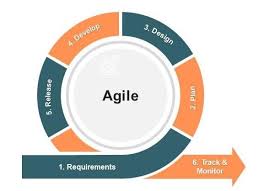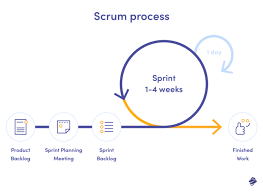The Benefits of Agile Project Management in Software Development
Agile project management has become increasingly popular in the software development industry due to its iterative and flexible approach. Unlike traditional project management methods, agile focuses on delivering small increments of work quickly and adapting to changes throughout the development process.
One of the key benefits of agile project management is its ability to respond to changing requirements. By breaking the development process into smaller iterations known as sprints, teams can quickly adjust their priorities based on feedback and new information. This allows for greater flexibility and ensures that the final product meets the needs of stakeholders.
Another advantage of agile project management is improved collaboration among team members. Agile encourages frequent communication and collaboration, which helps team members stay aligned on project goals and progress. This leads to higher productivity and better outcomes for software development projects.
Additionally, agile project management promotes transparency and visibility throughout the development process. By using tools such as burndown charts and daily stand-up meetings, teams can track progress in real-time and identify any potential roadblocks early on. This proactive approach helps prevent issues from derailing the project timeline.
In conclusion, agile project management offers numerous benefits for software development teams looking to deliver high-quality products efficiently. By embracing agility, teams can adapt to changing requirements, improve collaboration, and increase transparency throughout the development process.
Understanding Agile: Key Questions About Software Development and Project Management
- Is Agile good for software development?
- Which project management methodology is best for software development?
- What is Agile method in software project management?
- What are the 5 phases of Agile project management?
- Is Agile for software development or project management?
- Does Agile work for software development?
- What is Agile project management in software development?
Is Agile good for software development?
The question of whether Agile is good for software development is a common one in the industry. Agile methodologies have gained popularity for their ability to adapt to changing requirements, promote collaboration among team members, and provide transparency throughout the development process. Many software development teams find that Agile helps them deliver high-quality products more efficiently by breaking down work into smaller iterations and responding quickly to feedback. Ultimately, the effectiveness of Agile in software development depends on factors such as team dynamics, project complexity, and stakeholder involvement.
Which project management methodology is best for software development?
When it comes to software development, the question of which project management methodology is best often arises. While there are various methodologies to choose from, including Waterfall, Agile, Scrum, and Kanban, the best approach ultimately depends on the specific needs and requirements of the project. Agile project management is widely favored in the software development industry for its iterative and flexible nature, allowing teams to respond quickly to changes and deliver incremental value. However, some projects may benefit more from a traditional Waterfall approach that follows a linear progression of phases. Ultimately, the best project management methodology for software development will be determined by factors such as project scope, timeline, team size, and customer requirements.
What is Agile method in software project management?
The Agile method in software project management is a flexible and iterative approach that emphasizes adaptability, collaboration, and continuous improvement throughout the development process. Unlike traditional project management methods, Agile breaks down the project into smaller iterations known as sprints, allowing for quick delivery of working software and frequent feedback from stakeholders. This iterative approach enables teams to respond to changing requirements and priorities, leading to better outcomes and higher customer satisfaction. Agile promotes a customer-centric mindset, encourages teamwork, and fosters a culture of continuous learning and improvement within software development teams.
What are the 5 phases of Agile project management?
In agile project management for software development, the process typically consists of five key phases: initiation, planning, execution, monitoring and controlling, and closing. During the initiation phase, the project scope and objectives are defined, and key stakeholders are identified. In the planning phase, the team creates a roadmap for the project, including defining tasks, setting priorities, and estimating timelines. The execution phase involves implementing the plan through iterative development cycles known as sprints. The monitoring and controlling phase focuses on tracking progress, identifying risks, and making adjustments as needed to ensure project success. Finally, the closing phase involves delivering the final product to stakeholders and conducting a retrospective to review lessons learned for future projects.
Is Agile for software development or project management?
Agile is a methodology that is commonly associated with software development, but it is important to note that Agile can be used for both software development and project management. In the context of software development, Agile emphasizes iterative and incremental development, allowing teams to respond to changing requirements and deliver working software quickly. On the other hand, in project management, Agile principles can be applied to improve collaboration, adaptability, and transparency within the project team. Whether it’s for software development or project management, Agile provides a flexible framework that can help teams achieve better outcomes and deliver value to stakeholders effectively.
Does Agile work for software development?
The question of whether Agile works for software development is a common one in the industry. Agile methodologies have proven to be highly effective for software development projects due to their iterative and adaptive nature. By breaking down the development process into smaller increments and focusing on collaboration and flexibility, Agile allows teams to respond quickly to changes, deliver value incrementally, and ensure that the final product meets the needs of stakeholders. Numerous successful software projects have been completed using Agile practices, showcasing its effectiveness in improving productivity, quality, and customer satisfaction in software development.
What is Agile project management in software development?
Agile project management in software development is a methodology that emphasizes iterative and incremental delivery of work, allowing teams to respond quickly to changes and deliver value to stakeholders more efficiently. Unlike traditional project management approaches, agile focuses on breaking down projects into smaller, manageable tasks known as sprints, with frequent feedback loops to ensure alignment with project goals. This flexible and collaborative approach promotes adaptability, transparency, and continuous improvement throughout the development process, ultimately leading to higher quality software products that better meet the needs of end users.



